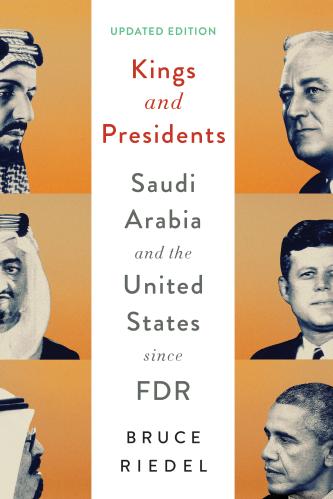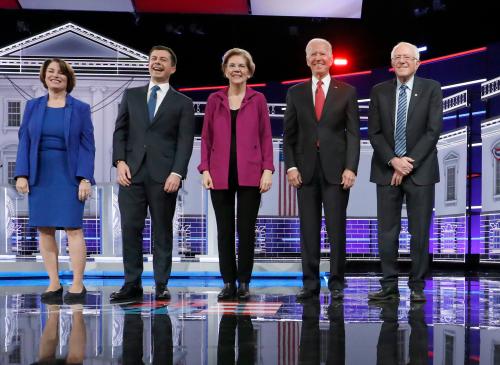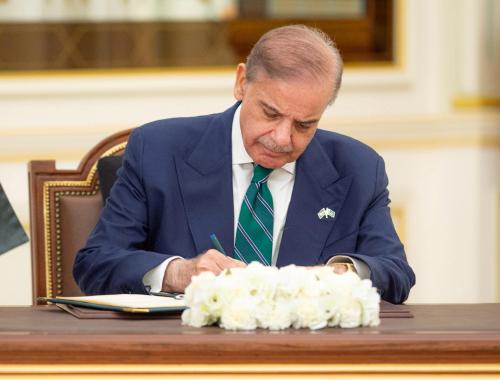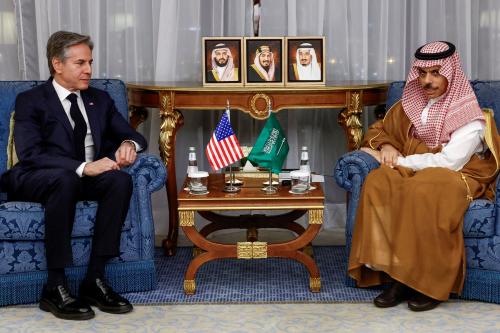A member of the Saudi Air Force killed three people at Naval Air Station Pensacola before he was shot dead by officers responding to the scene. Brookings Senior Fellows Daniel Byman and Tamara Wittes each weigh in on what we know, what we don’t, and what it could mean for U.S.-Saudi relations.
 Daniel Byman (@dbyman), Senior Fellow in the Center for Middle East Policy: Early this morning, a Saudi Air Force trainee stationed in Florida killed three people at the Pensacola Naval Air Station and wounded eight more. Representative Matt Gaetz, who represents Pensacola, has already declared the killings “an act of terrorism” and called for “extreme vetting” of foreigners who come to America to train. There is much we don’t know, and after such killings we inevitably have more questions than answers. However, the initial reports raise questions and offer food for thought as we wait for more information.
Daniel Byman (@dbyman), Senior Fellow in the Center for Middle East Policy: Early this morning, a Saudi Air Force trainee stationed in Florida killed three people at the Pensacola Naval Air Station and wounded eight more. Representative Matt Gaetz, who represents Pensacola, has already declared the killings “an act of terrorism” and called for “extreme vetting” of foreigners who come to America to train. There is much we don’t know, and after such killings we inevitably have more questions than answers. However, the initial reports raise questions and offer food for thought as we wait for more information.
Was it a terrorist attack?
We don’t know yet if the shooting was a terrorist attack. It very well might be, but a lot depends on the answer to a single question: Did the shooter have a political motive? Because he was a Saudi, there is a rush to assume a jihadi link — a predilection that is particularly strong given the important role Saudis played in perpetrating the 9/11 attacks. Yet the shooter might be mentally disturbed, angry over a personal grievance, or otherwise violent for non-political reasons. This is the fourth shooting incident at a U.S. military base this year, and none of the others were linked to terrorism.
What do we want of Saudi Arabia?
Florida Governor Ron DeSantis has already called for compensating the shooting victims, but blood money is not what we should seek. This is especially so as the Saudi government is usually aggressive at going after jihadi groups because it sees them as a threat to the kingdom’s own security. Instead, what we need immediately from Saudi Arabia is information. Answering the question of terrorist intent may require interviews with those who knew the pilot, any writing or social media posts he left as a record, and similar data that might help us understand what was behind the violence.
If a terrorist goal is established, the next questions concern whether he had links to a broader network or others who inspired, trained, or otherwise helped make the attack happen. If, as is often the case, he had associates, then the priority is rooting out the network, and the Saudis and the United States should work closely to do so. If he acted alone, then the counterterrorism focus of the kingdom should be on preventing others from consuming propaganda or otherwise being inspired. Here the Saudi record is much weaker, as the kingdom has often been the source of hateful propaganda and support for radical causes that have helped indoctrinate future jihadis.
Recognize success as well as failure
Assuming it was a terrorist attack, it is tempting to jump to the conclusion that terrorism is on the rise, that counterterrorism as a whole is failing, or otherwise make dire predictions. But, before Pensacola, jihadis have killed zero Americans on U.S. soil so far this year, a rather impressive record. And President Trump was right to be proud that the Islamic State has been hit hard and its leader killed. Just as we must consider what the horror at Pensacola means, we must also recognize the many successes that have occurred.
The value of military-to-military programs
Of course foreign soldiers who come to train in the United States should be vetted, but Americans should recognize the value of these programs for national security. Training foreign militaries is an important form of American soft power and a way to advance U.S. security objectives. Not surprisingly, there is a vast government effort set up to support it. Training programs are hardly perfect, and foreign officers who train in the United States have been involved in coups, human rights abuses, and otherwise act against the values military training tries to impart. Nevertheless, foreign officers who spend time in America understand our country better and usually form positive impressions about it and the soldiers, sailors, and Marines they worked with while they are here. This can pay dividends as they rise in the ranks and become senior officers. In addition, through training the United States makes allies more capable of defending their countries or working in conjunction with U.S. forces, both of which can save American lives and aid U.S. interests.
An opportunity for Saudi Arabia’s critics
Saudi Arabia is already under pressure due to its disastrous military campaign and boycott in Yemen, murder of Saudi journalist Jamal Khashoggi, and other outrages. President Trump has shielded the kingdom from direct punishment and will likely to so again. Riyadh, however, is feeling the heat, embracing negotiations in Yemen and with Qatar, which it has feuded with and tried to blockade for over two years. It is tempting to use any Saudi association with the Pensacola shooting to raise the heat further on the kingdom, but this should only be done if there is a clear government link to the shooting, gross regime incompetence, or a refusal to share necessary information with the United States — judgments that will take many days to be determine.
 Tamara Cofman Wittes (@tcwittes), Senior Fellow in the Center for Middle East Policy: The shooting in Pensacola, Florida today — in which a Saudi Air Force officer killed three and wounded eight more — may further destabilize an already-shaken U.S.-Saudi relationship. King Salman immediately called Donald Trump to offer his condolences and distance the kingdom from the shooter: “This person in no way shape or form represents the feelings of the Saudi people, who love the American people,” the king conveyed to the president. But the damage is real.
Tamara Cofman Wittes (@tcwittes), Senior Fellow in the Center for Middle East Policy: The shooting in Pensacola, Florida today — in which a Saudi Air Force officer killed three and wounded eight more — may further destabilize an already-shaken U.S.-Saudi relationship. King Salman immediately called Donald Trump to offer his condolences and distance the kingdom from the shooter: “This person in no way shape or form represents the feelings of the Saudi people, who love the American people,” the king conveyed to the president. But the damage is real.
Much work on both sides overcame the devastating impact of the 9/11 attacks on American perceptions of the Kingdom of Saudi Arabia, and this attack will likely raise all those issues and emotions anew. This impact is layered on top of the damage done to the relationship over the last few years by a series of Saudi behaviors. The devastating humanitarian costs of the war in Yemen, the kidnappings and shakedowns of royals and other businessmen in the Riyadh Ritz-Carlton, the murder of Jamal Khashoggi, and the torture and trials of women activists have all broken trust between Riyadh and its patrons in Washington — especially but not exclusively on Capitol Hill. As David Ignatius reported in yesterday’s Washington Post, senior State Department and CIA officials likewise resent the kingdom’s failure to take responsibility or learn lessons from these episodes, particularly Saudi intransigence over constraining abusive intelligence practices or holding Saudi al-Qahtani, the crown prince’s close adviser, accountable for his role in the Khashoggi murder. Just a few weeks ago, the U.S. Justice Department charged three individuals with spying, revealing that the kingdom bought spies inside Twitter to steal information from the company on Saudi dissidents.
Saudi Arabia has notably shifted policy in two areas in recent weeks, seemingly in an effort to respond to pressures from the Trump administration: engaging more energetically to support a negotiated end to the war in Yemen, and opening a small channel to Qatar by allowing the Saudi team to travel directly to Doha and participate in the Gulf Cup football match. But these foreign policy shifts, while important and welcomed in Washington, leave unaddressed core issues that undermine American trust in the judgment of their Saudi partner.
And now, in the face of that challenge, this horrific attack in Florida will remind Americans that the kingdom — while reforming in some significant ways — remains rooted in an extreme religious-political ideology. That ideology has been inculcated in generations of young Saudis, as well as exported abroad, in ways that generated extremist violence that targeted both the kingdom itself and the U.S. homeland.
We don’t yet know the full story of what motivated this Saudi officer to open fire on his classmates in Pensacola. But the event instantly challenges those, whether in the Trump administration or in the private sector, who have been seeking to brush aside concerns about the kingdom’s trajectory. It will sharpen questions on Capitol Hill about why the United States government is training Saudi pilots whose bombing raids harm civilians in Yemen. And for elected officials — perhaps particularly those for whom Florida is an important state to win in 2020 — this attack inevitably re-asserts questions about whether and to what extent a close and uncritical U.S. partnership with Saudi Arabia is in line with American interests.
The Brookings Institution is committed to quality, independence, and impact.
We are supported by a diverse array of funders. In line with our values and policies, each Brookings publication represents the sole views of its author(s).









Commentary
The Pensacola attack by a Saudi pilot: Implications for US-Saudi ties
December 6, 2019